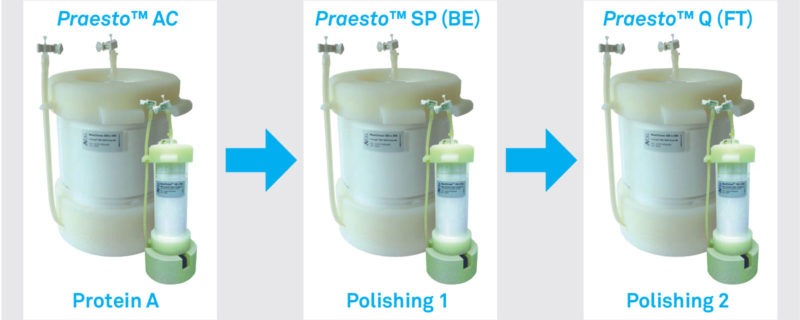
Purpose-designed Protein A resins for Improved Downstream Process and Cost Efficiency in MAb purification
As part of our BPI West 2016 coverage, we will be writing about some of the posters presented at the conference. One poster that caught my eye for downstream was presented by Purolite, “Purpose-designed Protein A resins for Improved Downstream Process and Cost Efficiency in MAb purification.” In the poster, Purolite describes the concept of Protein A resins that are designed for a specific purpose, and that the use of their purpose-designed resins can provide significant cost and time saving advantages over the use of standard resins.
Protein A Affinity Chromatography Background
The use of Protein A affinity chromatography is commonplace in biopharmaceutical manufacturing. This form of chromatography is both simple to use and very effective at binding the target molecule. However, the Protein A chromatography step can be costly, thus binding capacity and efficiency is something that is closely evaluated as a way to get the most out of a company’s Protein A Resin investment.
The Case for Purpose-designed Protein A Resins
One area where Protein A Resin may not be used efficiently is in early phase clinical material production. The challenge with clinical trial material production is that since less material is needed, smaller-scale manufacturing must be run using the same tools used in full-scale platform purification. As a result, purification of early-phase clinical material can be costly and inefficient.
This is evident in the use of more expensive resins like Protein A. When looking at the cost per cycle or cost per gram of product, these early phase clinical runs can be extremely costly. In the case of Protein A, most clinical manufacturing can be achieved in less than 20 cycles, while Protein A resin is typically designed for hundreds of cycles. Thus, in early phase clinical manufacturing you aren’t utilizing the full lifetime available in the resin, which significantly increases both the cost per cycle and cost per gram.
In response, Purolite has designed and evaluated Praesto AC specifically for production of early-phase clinical material. Praesto AC is a high flow agarose resin that has been optimized to provide the needed Protein A resin with a lifetime more appropriate to early-phase clinical production and other small volume manufacturing, while maintaining high capacity. With Praesto AC, the base matrix, ligand and coupling are optimized for high productivity, cost-effective MAb processing. It is designed for up to 20 cycles, which meets the need of most Phase I and Phase II clinical manufacturing requirements. To provide further time savings, also key in early phase material manufacturing, Praesto AC is available in pre-packed formats. This provides time savings from the elimination of labor intensive steps like column packing, evaluation and cleaning procedures. It also reduces the risk of packing failures and microbial contamination.
Data in the poster compares the use of Praesto AC with the market-leading agarose Protein A resin and finds that approximately 50% savings can be achieved in small scale manufacturing by using Praesto AC in pre-packed columns.
